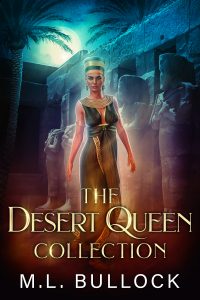
The Desert Queen snippet!
Okay, I’m totally excited for this book to come out! Check out that fantastic cover! Wow! This isn’t your average urban fantasy story, so be sure to keep an eye out on Wednesday for the release announcement! Until then, check out the Prologue!
Prologue
Egypt—18th Dynasty
Farrah stood outside the door of the tent and stared up into the night sky. No matter how heavily time etched cruel marks on her face, the view grabbed her breath as if her dark eyes were seeing it for the first time. The lines on her brown face deepened as she pursed her lips. The air around her was pregnant with the future, but her inner sight was dark and full of mystery. Her limited insight into the other world made her uncomfortable. She made the sign of peace to the Dancing Man that hung above her in purple-blackness as he rose above the tribal camp. The Cushite traders called the Dancing Man a different name—Osiris he was called in the Black Lands and beyond—but here in the Red Lands where the red sands swirled and swam about the desert people like a dead ocean, he was known as the Dancing Man.
How long will we travel this path? An endless caravan moving from one rain oasis to another? Many of the clan no longer know from whence they came or that there had once been a place for them. How many Meshwesh must die in the Red Lands before we see those white walls again?
Once the Meshwesh dwelled in a city of white stone, Zerzura. What a city it had been! Farrah could barely remember the feeling of cool stones under her feet, the tastes of orange fruit sweet on her tongue, and the many pools of clear blue water that her young body had swum in. Had it been just a dream? No, Farrah remembered the day when the cowardly old king, Onesu, had fled the city ahead of the horde of giants who rushed in to claim it. But he had not lived one day after he left Zerzura, for Farrah had cut his throat while he slept. When he awoke to see her face above him, she whispered why she had done it as she watched him bleed. He had lost the city and had abandoned Ze, his queen and Farrah’s sister, leaving her to the pleasure of the giants who no doubt raped her to death. Farrah shuddered inwardly thinking of what she had done. Nobody knew, yet it was a spot on her soul. She did not regret it, although the gods had seen fit to take her inner sight from her as punishment for her crime. That had been long, long ago. His face no longer haunted her. Yet often she imagined she heard Ze’s screams in the clear night.
Now, with a silent prayer Farrah considered again the stars above her. Regardless of the constellation’s name, this sour omen was an inauspicious sign for the birth of a royal child, but there was nothing she could do to prevent it. Even her magic could not stop a child who wanted to enter this realm.
Farrah suddenly felt old. Had she, leader of the Council of Old Ones, become too old to consider the deeper meaning of such things? Was she too old to help bring another baby into this increasingly difficult world? The sounds the mother made, the painful moaning, the calling of her name, let Farrah know that she indeed still had a purpose. She took a deep sigh, breathing in the warm desert air and shaking off the unseen trepidation. She tossed her head cloth to the ground. No heads covered this night. She smiled peacefully as she walked to the birthing bed and looked down into the face of the beautiful Kadeema.
What a beauty the young queen had been when she first arrived here as the bride to Semkah! However, the Red Lands had sapped away her pretty softness like it did to all women who were not of true Red Lands’ blood. She had become hard, hard like the clay that lay beneath the rough sand. Kadeema’s olive skin was no longer pale but red, and her hair no longer like bright copper but dark and dull. The young queen’s eyes still had their sea-green beauty, but the sparkle, the joy of love and living, had faded. A wife of a young tribal king tied to the Red Lands people only by the most tenuous of threads—love. Farrah looked into those eyes, saddened to see that where there had been hope and excitement, there was now fear and regret.
When Kadeema arrived, the people had loved her, celebrating her light skin and unusual eyes with poems and songs. She had been like a child—a treasure to them, for the tribe treasured children above all things. Their young prince needed a bride, and why should he not take a beautiful bride like Kadeema? She was the daughter of a faraway Grecian king who was a friend to the tribe, so it was a good match.
Semkah was not a king like his brother Omel, who was fierce, strong and brave yet crafty and changeable. Semkah was steady and ever obedient to the Council, trusting them in all things that concerned the Meshwesh. Omel never displayed such devotion.
Semkah wore the tribal king’s robes early after the death of his father, but he cut a fine figure even as a young man. Farrah remembered that day. She’d watched as his arms were tattooed with the sign of the tribe, the falcon’s wings with a swirl of sand wrapped around it. He had worn his hair long, with two long braids at his temples. His chest gleamed with turquoise and gold necklaces from the mines of the Meshwesh, and at his wrist were the slender snake bracelets that only kings wore.
The young king’s older brother Omel had an unabashed love for all things Egyptian. He wore linen Egyptian tunics that showed his scrawny, tanned legs. Tall and thin, Omel kept his dark hair shaved and his head shone with oils. Sometimes he wore a folded cloth on his head, but always his eyes were lined with black, as if he were an Egyptian royal. There was no doubt amongst the Council that Omel loved the Black Lands and would abandon his heritage if given a chance. But for that, he needed his brother. Semkah and Omel had received a divided inheritance—a smart and seemingly prophetic move by their wily father, Onesu. Semkah held the turquoise mines and Omel the gold, but they shared a workforce and the resources required to continue the work. Farrah suspected that Omel would seek to correct this. Already he drew men to his side like flies to a sweet fruit. She wondered what he promised them.
The brothers had different ideas about the future of the clan. Omel wanted with much passion to bring them into Egypt’s good graces. Farrah spat on the ground at the thought of such nonsense. Semkah’s dream was different—he dreamed of reclaiming Zerzura, as was his right, but he had no way of accomplishing that. No more than his father had.
Omel often met with Semkah and other tribal leaders to try to rally them to his point of view. “We need Egypt, brothers! They have wealth beyond measure and green lands that are just waiting for our plows. Come with me to Egypt and meet with Huya. He has given me his oath that Pharaoh wants to honor us with these lands.” Semkah had laughed at this idea and made no secret that he wanted no part of Omel’s Egyptian ways.
“And what will Pharaoh require, brother?” Semkah had said with a patient smile that only further angered Omel. “The king of Egypt does not simply give away lands to appease his neighbors. What of our inheritance? Have you given up finding our homeland, all for a bag of beans from Egypt’s hand? I know what it will require, and that I cannot do. Pharaoh will take our mines, our cattle—maybe even our wives and children—and for what? Some soggy ground so wet that only mosquitos dwell there? How can you ask this of me? What do I say to my tribe?”
Omel had scowled but said nothing else on the matter at that time. Farrah did not think any of the Council or the other leaders believed they had heard the last of Omel’s desires. But Semkah never saw the dark side of his brother; he only recognized the good. He had a heart of gold.
Farrah mumbled to herself remembering the night Semkah was born. What were the words she had said over him as she cradled him on that first night? “He will pursue love from one end of the desert to another. He will give his life for love, and that is the noblest of deaths.”
That had been her proclamation then. She wondered what the hidden words would be tonight or if her old ears would even hear them. She shook her head, reminding herself to stay in the present; she had a habit of getting lost in the past so many times lately. With authority, she flipped up the dress of the writhing Kadeema. She prayed and swayed, calling on her ancestors to assist her.
“No! Do not call on them. They must not know…!” Kadeema shouted savagely.
Farrah could not help but shudder. In her madness, Kadeema could offend a wandering spirit or worse. Farrah made a secret sign to ward off evil curses. Before she could protest further, Kadeema’s womb burst forth blood and she screamed into the musky night. Farrah nodded and prayed silently as she examined the woman’s body.
Something was amiss. Ignoring Kadeema’s scream, she probed inside her with expert fingers and felt the baby’s head. No! Inside the queen were two babies, two lives struggling to emerge into this world. Without knowing how she knew, she did know—these would be the only children of Semkah and Kadeema. Before they were born, it had been prophesied that from Semkah’s tribe would come the mekhma, the leader who would carry them home. Farrah felt an excitement greater than the fear, an urgency like none she had experienced before. These children must be born!
Who else has chills? I know I do! I sure hope this book goes live fast!


